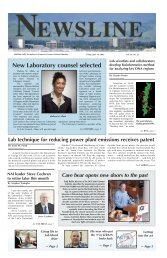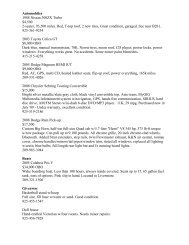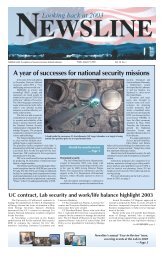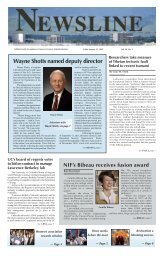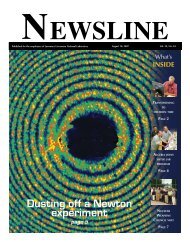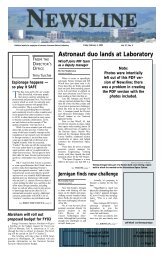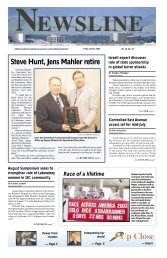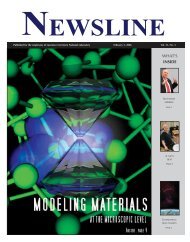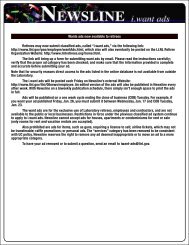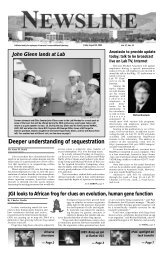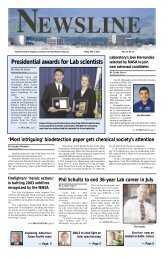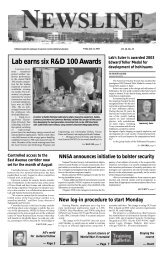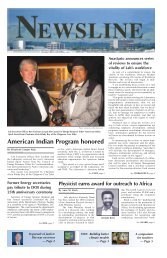ASCI White partnership celebrated - NEWSLINE - Lawrence ...
ASCI White partnership celebrated - NEWSLINE - Lawrence ...
ASCI White partnership celebrated - NEWSLINE - Lawrence ...
You also want an ePaper? Increase the reach of your titles
YUMPU automatically turns print PDFs into web optimized ePapers that Google loves.
Friday, August 17, 2001<br />
TELLER<br />
Continued from page 1<br />
guished Hungarian living in the<br />
world today.”<br />
Maria Schmidt, of the<br />
Hungarian delegation, said that the<br />
prime minister considers Teller’s<br />
contributions toward ending the<br />
Cold War to be the primary force<br />
behind the fact that Hungary is again<br />
a free nation today.<br />
“Everybody in Hungary knows<br />
Edward Teller’s name. He made<br />
progress not only for Hungary, but<br />
for the world,” said delegate<br />
Szabolcs Kerek-Barczy.<br />
One audience member said<br />
after the ceremony that as a child in<br />
Hungary, he knew the names of<br />
two famous Hungarians, the 19th<br />
century composer Franz Liszt and<br />
Edward Teller.<br />
The presentation honored<br />
Teller’s work on the hydrogen<br />
bomb for having “helped end the<br />
Cold War without bloodshed.”<br />
Teller himself, who has received a<br />
multitude of honors from around<br />
the world, said that this one accomplishment<br />
is what he believes to be<br />
his greatest achievement.<br />
The Hungarian delegates<br />
spoke of Teller’s accomplishments not only as a scientist,<br />
but as a poet and pianist as well. “I am<br />
touched by the way he talks about the future of<br />
Hungary and often cites Hungarian poetry to support<br />
his arguments,” Varhegyi said.<br />
After the gleaming gold medal with his name<br />
engraved on the back was placed around his neck,<br />
Teller thanked Prime Minister Orban, and also recognized<br />
his fellow Hungarian scientists and their<br />
contributions to modern science.<br />
“The 20th century was the most remarkable period<br />
in scientific discovery. But, I would have liked to have<br />
been born a quarter century earlier,” Teller said. “Then,<br />
if a scientist believed in God, he had to admit God was<br />
unimportant. But through quantum mechanics, we<br />
know that creation is never complete.<br />
“In science, what was impossible 50 years ago<br />
is now reality. The next century is unpredictable,”<br />
he continued. “Further knowledge for everybody’s<br />
By Ali Carrigan<br />
<strong>NEWSLINE</strong> STAFF WRITER<br />
Edward Teller simply refuses to retire, in the traditional<br />
sense of the word. Though he is no longer in the<br />
office every day, Teller continues to pursue science<br />
while encouraging students to do the same.<br />
Born in Budapest, Hungary, in 1908, Teller did not<br />
utter a word until he was three years old. His parents<br />
feared retardation, but when the child finally began to<br />
speak, it was in complete sentences. Shortly thereafter,<br />
he was inventing mathematical games to amuse himself.<br />
At an early age, he read and understood Euler’s<br />
text on algebra. Mathematics professors consulted by<br />
Papa Teller regarded the boy as exceptional in the subject.<br />
Teller’s early educational ambitions were to study<br />
mathematics at the university. He was deterred in this<br />
by his father, who, concerned about Edward’s professional<br />
future, bade him to study chemical engineering.<br />
For two years Teller complied, but he was pulled away<br />
by the excitement over quantum mechanics, the new<br />
theory of physics that was changing the way scientists<br />
viewed atoms and molecules. Teller moved to the<br />
University of Leipzig, where he studied under Werner<br />
Heisenberg.<br />
Just before he entered Leipzig, tragedy struck:<br />
Teller, absentmindedly missing his trolley stop, jumped<br />
off the vehicle after it had restarted and fell under its<br />
tracks. He lost a foot to the accident and has since then<br />
depended on a prosthesis. The accident prevented him<br />
from engaging in many athletic activities, but his competitive<br />
spirit and determination allowed him to excel<br />
in one – Ping-Pong. Teller has said that he was not<br />
benefit; that is my high aim for the next century. I<br />
pray, wish and ask for your success.”<br />
Concluding the intimate ceremony, Teller<br />
humbly remarked, “What I have done was not easy<br />
to do, but I always did what I wanted. I thank you<br />
for this honor. I may not have deserved it, but I<br />
have certainly enjoyed it.”<br />
His final comments were followed by the national<br />
anthems of both Hungary and the United States.<br />
Former Lab director John Nuckolls said after<br />
the ceremony that he truly appreciates Teller’s<br />
“mind, spirit, determination and creativity.”<br />
Nuckolls recognized Teller as a key to the<br />
founding of LLNL. “Without Teller,” Nuckolls<br />
said, “there would have been no Livermore Lab.<br />
He gave the Lab a spirit of public service.”<br />
But Teller’s most important contribution,<br />
Nuckolls said, was, as President John F. Kennedy<br />
said, “the survival of liberty” in Teller’s work<br />
Newsline 3<br />
Arts and education highlight Teller’s life of science<br />
greatly afflicted by the loss of his foot; Werner<br />
Heisenberg has said that it was the hardiness of Teller’s<br />
spirit, rather than stoicism, that allowed him to cope<br />
so well with the accident.<br />
Teller met his wife, Augusta Maria, or “Mici,” as<br />
she was called, through his friendship with her older<br />
brother. The couple married in February 1934 after a<br />
long courtship punctuated by separations due to his<br />
university studies and appointments. Despite the long<br />
hours he devoted to his work and the numerous<br />
moves from one laboratory to another, Mici was an<br />
integral part of Teller’s life for more than 60 years.<br />
The family eventually included two children – a son,<br />
Paul, and a daughter, Wendy.<br />
Even though Teller’s first love is science, he has<br />
also pursued other interests throughout his lifetime,<br />
among them music. He is an accomplished pianist<br />
with an extensive classical repertoire. When relaxing<br />
at the piano with Mozart, he is unhappy about being<br />
interrupted, as happened one day when Leo Szilard<br />
phoned. Fortunately for Szilard, the reason for the<br />
call – confirming the fundamental basis for nuclear<br />
bombs – was interesting enough to displace<br />
Mozart.<br />
The Teller family was deeply affected by both<br />
World Wars, and this in turn affected Teller’s scientific<br />
career. His original desire was to pursue pure science;<br />
war turned him into an applied scientist who<br />
used his expertise to develop weapons in the service<br />
of the United States. His work on the hydrogen bomb<br />
was an important accomplishment, especially when<br />
the United States began competing with the Soviet<br />
Union to develop the H-bomb.<br />
JACQUELINE MCBRIDE/TID<br />
Dr. Edward Teller displays the first Hungarian Corvin medal to be awarded since<br />
1930. The Medal recognizes outstanding achievement in the arts and sciences.<br />
during the Cold War.<br />
Today, Nuckolls said, Teller<br />
stands for openness in science, and<br />
opposition to secrecy.<br />
“He has been a primary mover in<br />
the promotion of post-Cold War<br />
Russian-American (scientific) cooperation.<br />
And he still has much to<br />
contribute on the subject of scientific<br />
ethics.”<br />
Lowell Wood and John<br />
Holzrichter, longtime LLNL colleagues<br />
of Teller’s, offered heartfelt<br />
congratulations to Teller on receiving<br />
the award. “We salute your accomplishments,<br />
primarily in science, but<br />
also in the arts,” Wood said.<br />
Holzrichter particularly thanked<br />
Teller for his contributions in the field of<br />
education. Teller taught for several<br />
decades at UC, where he founded the<br />
departement of applied science as part of<br />
UC Davis at the Livermore site, and at<br />
Stanford, where he is still a member of<br />
the Hoover Institution on War,<br />
Revolution and Peace. “Considering the<br />
turbulence in Hungary during Teller’s<br />
life — in the 1930s under the fascist government,<br />
then under the communists<br />
after the 1950s, and that during most of<br />
that time he was officially considered a<br />
‘non-person’— the fact that they now, as<br />
a fledgling democracy, honor him as a<br />
most distinguished Hungarian, is a very<br />
moving tribute,” Holzrichter said .<br />
The Corvin Medal comes with the right to bestow<br />
a three-year scholarship or grant of approximately<br />
$72,000 to the student or scientist of Teller’s choice.<br />
“Therefore contributing to the next generation of<br />
excellence in science,” Kerek-Barczy said .<br />
Only twelve living people can hold the Corvin<br />
Medal, Kerek-Barczy explained. Upon Teller’s death,<br />
the next recipient’s name will be engraved below his<br />
on the back of the medal. When the space for names<br />
has been filled, the medal will be retired to the<br />
Hungarian National Museum in Budapest.<br />
Currently, two other Hungarians stand to receive<br />
the award this year: historian John Lukas and Nobel<br />
Prize-winning chemist George Olah, both of whom<br />
live in the United States.<br />
The full ceremony airs on Lab TV Channel 4<br />
Aug. 27 - 31 at 10 a.m., 1 and 4 p.m.<br />
Shortly after World War II, Teller began teaching<br />
at the University of Chicago. By 1949, Teller was<br />
also the assistant director of Los Alamos<br />
National Laboratory in New Mexico. It was at<br />
this time that Ernest O. <strong>Lawrence</strong> invited Teller<br />
to the Livermore site, asking him to “consider it<br />
as a site for a second laboratory.” Teller gave his<br />
blessing, and in 1952, he became a consultant to<br />
the newly formed University of California<br />
Radiation Lab at Livermore. In 1954, Teller left<br />
a teaching post at the University of California<br />
and became the associate director of the<br />
Livermore Lab. He served as its director from<br />
1958-1960, and guided Lab scientists through<br />
tests of the Polaris warhead during his tenure.<br />
Despite resigning as the director of the<br />
Livermore Lab, Teller continued to pursue scientific<br />
endeavors, though his focus shifted slightly to training<br />
the next generation of nuclear scientists. He<br />
spent many years as a professor of physics at the<br />
University of California. Teller was also the chairman<br />
of the UC Davis applied science program for<br />
the first three years of its existence, 1963 - 1966.<br />
Today, Teller is Director Emeritus of <strong>Lawrence</strong><br />
Livermore National Laboratory and senior research<br />
fellow at the Hoover Institution at Stanford<br />
University.<br />
Teller still speaks several times a year to students<br />
in the hopes that sharing his story will inspire<br />
the next generation of students to pursue science. He<br />
is able to look back with pride on a lifetime of<br />
achievements, but Teller’s focus has not changed: he<br />
continues looking to the future.



